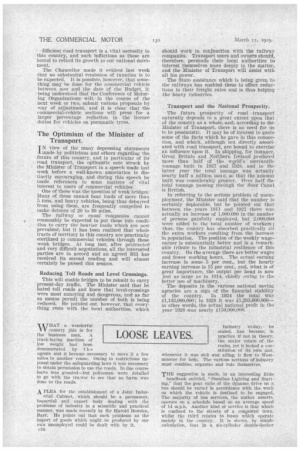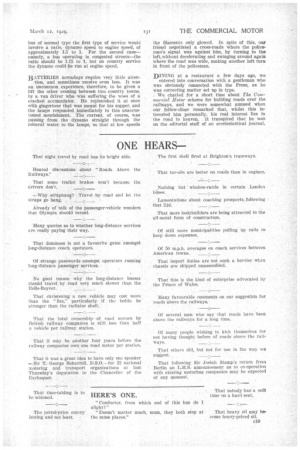W HAT a wonderful . country this is for the business
Page 48

Page 49

If you've noticed an error in this article please click here to report it so we can fix it.
man. A track-laying machine of low weight had been demonstrated by t h e agents and it became. necessary to move it a few miles to another venue. Owing to restrictions imposed under the safeguarding laws it was necessary to obtain permission to use the roads. In due course leave was granted—but policemen were detailed to go with the tractor to see that no harm was done to the roads.
A PLEA. for the establishment of a Joint Industrial. Cabinet, -Which should be a permanent, impartial and expert body dealing with the problems of industry in a scientific and practical manner, was made recently by Sir Harold Bowden Bart. He points out that such problems as the import of goods which might be produced by our own unemployed could be dealt with by it. c18 Indnstry to-day, he . stated, has become, itt practice if not in theory, the major estate of the realm, yet it lacked a coo-; stitution-of its own and, whenever it was sick and ailing, it flew to West-minster for help. The various sections of industry most combine, organize and rule themselves.
THE suggestion is made, in an interesting little handbook entitled, "Omnibus Lighting and Starting," that the gear ratio of the dynamo, drive on a bus should be varied in accordance with the work on which the vehicle is destined to be engaged. The majority of bus services, the author asserts, operate on a schedule based on an average speed of 14 m.p.h. Another kind of service is that which is confined to the streets of a congested tbwit, whilst the third relates to buses which operate mainly in the country. It is shown, by simple calculation, that in a six-cylinder double-decker bus of normal type the first type of service would involve a ratio, dynamo speed to engine speed, of approximately 1.5 to 1. For the second case— namely, a bus operating in congested streets—the ratio should be 3.75 to 1, but on country service the dynamo could be run at engine speed.
ATTERIES nowadays require very little atten tion, and sometimes receive even less. It was an uncommon experience, therefore, to be given a lift the other evening between two country towns, by a van driver who was suffering the woes of a cracked accumulator. He replenished it at once with gingerbeer that was meant for his supper, and the lamps responded immediately to this unaccustomed nourishment. The current, of. course, was passing from the dynamo straight through the mineral water to the lamps,SQ that at low speetls the filaments only glowed. In spite of this, our friend negotiated a cross-roads where the policeman's signal was against him, by turning to the left, without decelerating and swinging around again where the road was wide, making another left turn in front of the policeman.
DINING at a restaurant a few days ago, we entered into conversation with a gentleman who was obviously connected with the Press, as he was correcting matter set up in type.
. We chatted for a short time about The Commercial .Motor scheme for building roads over the • railways, and we were somewhat amused when our fellow-diner remarked that, whilst this interested him personally, his real interest lies in the road to heaven. It transpired that he was on the editorial staff of an ecceIesiastical journal,




























































































































